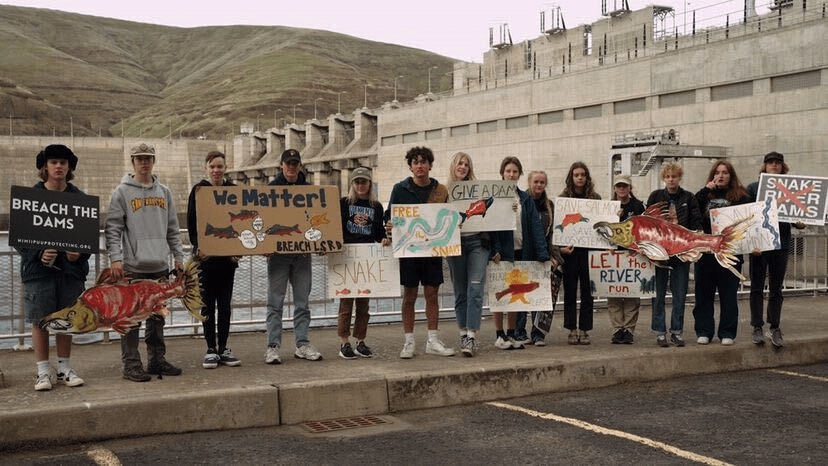the film
forum
library
tutorial
contact
|

|
Boise State Students Partner with Youth Salmon Protectors
to Raise Awareness About Effects Lower Snake River Dams
by Brydon Black
The Arbiter, April 27, 2022
|
"Salmon are a keystone species...
It's our job to protect the voiceless."
-- Amanda Thompson, Youth Salmon Protectors
 Boise State students are organizing to raise awareness on the effects of the lower Snake River dams on Idaho's endangered salmon population.
Boise State students are organizing to raise awareness on the effects of the lower Snake River dams on Idaho's endangered salmon population.
One of these students, Amanda Thompson, is a freshman majoring in environmental studies and minoring in climate change. She became involved with the Youth Salmon Protectors (YSP) this past year.
The YSP is an Idaho Conservation League (ICL) program with the stated goal of building a coalition among young people across the Northwest. The ICL is dedicated to honoring tribal treaties and breaching the four lower Snake River dams, located in eastern Washington, in an effort to save the dwindling salmon population in the Snake River watershed.
"Salmon are a keystone species, which means their lives affect the lives of all the other animals in the ecosystem, not only in Idaho but in the Pacific Northwest," Thompson said. "It's our job to protect the voiceless, like the salmon, and, just knowing the fact that if the salmon population keeps declining, we're going to see a lot more decline of other life in the ecosystem."
While there isn't currently a YSP student group on campus, Thompson confirmed that they are in the process of creating one.
Noa Bothe is a junior civil engineering major and is also involved with the YSP organizing efforts.
"Youth from Boise get together to talk weekly on Wednesday. We have a community centered around what's going on with the issue of salmon extinction in the Snake River," Bothe said. "The ultimate goal is political progress, leading up to that is getting the public educated. It's a great way for BSU students to get involved with local environmental and political causes."
Last week, the YSP members from Boise High dropped off 700 postcards to Gov. Brad Little's office written by students across the Treasure Valley, urging him to support breaching the dams.
The Snake River is the principal channel to the Columbia River and drains approximately 107,000 square miles in Washington, Idaho, Oregon, Wyoming, Utah and Nevada.
Between the 1950s and 1980s, the Army Corps of Engineers constructed the four lower Snake River dams: Ice Harbor, Lower Granite, Lower Monumental and Little Goose, all of which are located in Washington and still owned and operated by the U.S. Army Corps of Engineers.
Their website argues that the dams provide energy, delivery routes and economic benefits to the surrounding areas. However, Native people with treaty rights to fish salmon in these areas disagree.
Julian Mathews is the coordinator of Nimiipuu Protecting the Environments. He currently lives in Pullman, Washington, and works for his Nez Perce Tribe in Lewiston.
Mathews and the groups he works with are pushing for the dams to be breached or removed in an effort to save the Snake River's salmon population.
"It's important to us as a tribe and tribal members that we have a treaty right that we have fish, salmon, lamprey. We've eaten salmon for generations back before the non-Indians came here," Mathews said. "I don't want to be the generation that lost the salmon. These kids have treaty rights like I do to hunt, fish and gather within our regional territory. We're trying to protect the culture for our future generations."
Mathews encouraged people to urge their state representatives to support the breaching of the dams and commended Sen. Mike Simpson (R-Idaho Falls) for his support of the $33 billion proposed plan in breaching the dams.
Mathews also said people should look for monthly webinars presented by the Salmon Orca Project to stay informed. March's speakers included Delano Saluskin, chairman of the Yakama Nation Tribal Council, and Gerald Lewis Saluskin, Yakama Nation Fish and Wildlife Committee chairman.
A 2021 study concluded that with investments into renewable energy, the Federal government could breach the four Snake River dams and still have reliable energy at cheaper costs.
In 2019, more than 50 scientists sent a letter to Northwest policymakers saying that breaching the four lower Snake River dams was the only action that could counteract warm summertime water in the lower Snake and Columbia rivers that often reach temperatures lethal to salmon. The letter also warned that climate change will continue to worsen the problem of elevated water temperatures.
Brydon Black
Boise State Students Partner with Youth Salmon Protectors to Raise Awareness About Effects Lower Snake River Dams
The Arbiter, April 27, 2022
See what you can learn
learn more on topics covered in the film
see the video
read the script
learn the songs
discussion forum


 Boise State students are organizing to raise awareness on the effects of the lower Snake River dams on Idaho's endangered salmon population.
Boise State students are organizing to raise awareness on the effects of the lower Snake River dams on Idaho's endangered salmon population.
